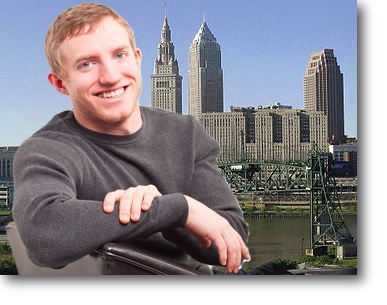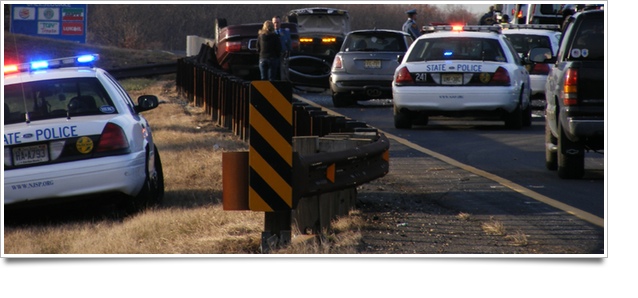By Joe Baur
A life was tragically lost in Cleveland last Wednesday morning in a scenario that seems all too familiar.
Put that first sentence into a story about a shooting or hate-crime incident and it gets top billing in the news – as they should. When it comes to traffic, however, fatalities are merely an inconvenience for drivers still living. Just another statistic.
Wednesday’s fatality on Interstate 77 was certainly not the first nor will it be the last highway fatality in Cleveland. But rather than doing anything to change this tragic reality, we act as if it was that person’s time. Though the idea that a fatal collision is the same as a 95-year-old grandmother going into the light is laughable.
Still, we turn to the inconvenience of the fatality almost instantaneously.
Take a tweet from Jamie Sullivan, 19 Action News’ Traffic Anchor, reporting on the accident during her usual morning Twitter coverage of #CLETraffic.
From “FATAL ACCIDENT” to “detour?” in nearly the same breath.
How would that fly in other fatalities?
“Street closed due to a FATAL SCHOOL SHOOTING. Detour? Avoid the sirens and grieving families by turning left early.”
For some reason, we have become so immune to highway fatalities that we can only think of the inconvenience they pose to our commute. Until, of course, we’re involved. Then we wonder how people could be so insensitive as to turn our tragedy into traffic news.
Ms. Sullivan is hardly the only culprit when it comes to this ongoing phenomenon of fatality inconvenience. And to be fair, she’s usually great about encouraging her followers to take transit to avoid rush hour traffic and, y’know, generally risking your life on the increasingly negligent highways of America.
I think it’s fair to say that any Cleveland media outlet with traffic coverage has likely been guilty at some point of underemphasizing the loss of life before discussing the inconvenience to commuters. In fact, Cleveland.com opened with this in covering the same fatality.
“Cleveland police say a fatal car crash on Interstate 77 Wednesday morning will likely keep a stretch of the roadway closed through rush hour.”
To me that almost reads as, “Some asshole got in the way of your commute.”
Can you imagine being the victim of a fatal crash with the news of your demise immediately followed by the inconvenience you’ve caused others? Imagine a family member was involved and reading essentially, “Thanks to this person’s dying on a highway, your morning just got slightly inconvenienced.”
Perhaps worst of all in this debacle of Cleveland traffic coverage is the role played by the Ohio Department Of Transportation. Two reasons come to mind.
One, ODOT continues to fund highways almost exclusively. Whether it’s expanding highways or repairing dilapidated highways, Ohio tax dollars go to road infrastructure projects to the tune of about 95 percent of the time. No surprise, considering ODOT Director Jerry Wray comes from the asphalt industry.
Alternative transportation receives what we can generously call the bare minimum. Ohio is one of the worst states at funding public transportation despite being one of the most urbanized states in the country. Blame for highway fatalities rest, at least to some degree, on the shoulders of those at ODOT who insist on forcing Ohio commuters onto dangerous roads.
Two, ODOT seems unwilling to admit just how dangerous highway driving is. At least Ms. Sullivan had the courtesy to note that there was a fatality in Wednesday morning’s crash. Here’s @ODOT_Cleveland’s take.
“CUY: All lanes of I-77 SB are closed at Fleet Ave due to an accident. Use I-77 NB to I-490 WB to SR 176 SB to I-480 EB to get to I-77.”
That tweet was followed up about an hour later with essentially the same information. @ODOT_Cleveland ended their coverage of the fatal crash by simply noting that lanes on Interstate 77 were opening up.
Not one mention of someone losing their life due in part to the transportation system ODOT has forced on us all.
So why is this important? Well, it’s a health and safety issue.
Americans in general have a skewed vision of driving. We see ourselves as safe drivers, whereas everyone else is the problem. Nobody wants to think about the fact that many fatal crashes happen at no fault to the driver. Sometimes, it’s just really bad luck.
Of course this can happen with more sustainable forms of transportation, such as cycling and rail, but it happens to such a far-less degree that it’s not even worth comparing.
So when Clevelanders see common highway fatalities reduced to mere inconveniences, it gives us a false perception that driving is safe. We lose respect for the power we have behind the wheel, and it only makes our streets more dangerous.
Highway fatalities deserve the same coverage as any other preventable tragedy. Until then, Northeast Ohio media outlets are doing you a grave disservice.
[Photo: Ted Kerwin (Flickr)]
 Joe Baur is a freelance writer, filmmaker and satirist with a diverse array of interests including travel, adventure, craft beer, health, urban issues, culture and politics. He ranks his allegiances in the order of Cleveland, the state of Ohio and the Rust Belt, and enjoys a fried egg on a variety of meats. Joe has a B.A. in Mass Communication with a focus on production from Miami University. Follow him at http://JoeBaur.com and on Twitter @BaurJoe.
Joe Baur is a freelance writer, filmmaker and satirist with a diverse array of interests including travel, adventure, craft beer, health, urban issues, culture and politics. He ranks his allegiances in the order of Cleveland, the state of Ohio and the Rust Belt, and enjoys a fried egg on a variety of meats. Joe has a B.A. in Mass Communication with a focus on production from Miami University. Follow him at http://JoeBaur.com and on Twitter @BaurJoe.


4 Responses to “Changing The Way We Cover Cleveland Traffic”
Michael
They’re traffic reporters. Their job is to report the traffic!
Perhaps another segment of the news could (and probably did) cover the loss-of-life angle. That’s where it would be appropriate to mention the who, why, and how…and the story behind the accident.
Tens of thousands of commuters depend on traffic reports. Getting stuck in a big traffic jam can make people late for work, for school, throw off schedules with daycare, etc. Multiply that times thousands of people, and it’s a big deal affecting all of our lives.
I’m not saying the loss of life is insignificant at all. Without a doubt, it deserves to be covered by the news, and to be mourned by the public. But asking traffic reporters to stop doing their job to cover the loss-of-life aspect of the accident is going too far in the other direction.
bob
I HATE broaching this subject BUT CAN pic baby ped drones being used for THIS purpose….WE know THAT day is coming and as usual legalbegal is BEHIND the curve and catching up…. I THOUGHT were APPS out there NOW to avoid lot of this…eventually cars will be rigged this way….HECK…got such a system NOW on i-71 with those LED signs letting one know bout BS up ahead…
Jill
It is more important to notify the families privately. Thousands of drivers are inconvenienced by an accident temporarily. For a small group of surviving friends and family, a traffic fatality is a tragedy with lifelong impact. It would be terrible to learn a loved one had been killed by seeing their car on a traffic report update on social media. I get your point that the public should be informed about unsafe areas or chronic problem points but this type of information is better in follow up stories than a traffic report.
Shari Alexander
Until the family is notified, those news reports should not be permitted to be televised. I can testify to the fact that such a report does have a lifelong impact.
Many years ago my family found out that my sister had died via a news report that showed the shoe of a woman who had been found dead. My grandmother recognized her shoe. It was a horrible way to find out that my sister was dead.
Every time I see a news report about a traffic fatality and the report shows the destroyed vehicle I wonder…Is the family watching the news while they are waiting for their loved one to get home from work? Is this how they learn of the death of their loved one?